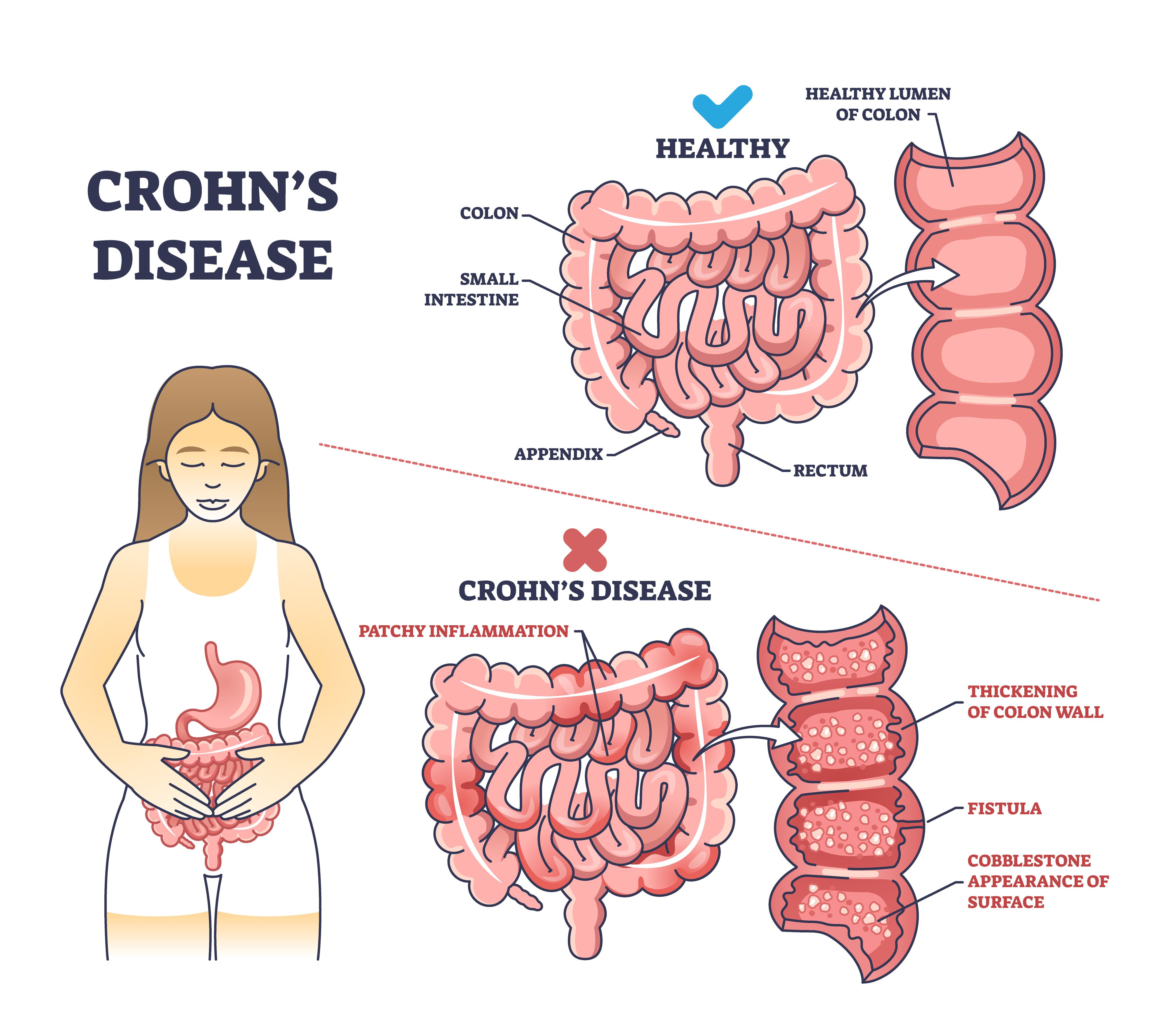The Prevalence, Incidence of One of the Most Dreaded Complications of Crohn’s Disease: Fistulas
About 30% of people with Crohn’s disease, but on a population basis, it is rare event.
Crohn’s disease (CD) is a chronic gastrointestinal condition characterized by periods of exacerbations alternating with periods of symptom remission. Over time, patients can develop serious complications, including fistulas, tunnel-like connections that form between the bowels and surrounding organs, including the bladder and anus. Fistulas can also result in openings in skin. They create a path for contents of the bowel to leak into organs or through openings in the skin.
Some evidence suggests that fistulas have become less common as an increasing number of people are treated with biologics, such Humira (adalimumab) and its biosimilars and Remicade (infliximab) and its biosimilars.
Treatment for fistulizing CD involves a combination of antibiotics, immunosuppressants, and biologics to achieve and maintain remission and surgery to repair the fistula. This complication significantly impacts patients’ quality of life and contributes to the healthcare utilization burden.
It’s estimated that up to 30% of people with CD will develop fistulas sometime during the course of the disease. However, few population-based studies that look at the problem across an entire population, not just those with Crohn’s disease, have been done
Yanni Fan, D.Sc., and his colleagues from Boehringer Ingelheim Pharmaceuticals conducted a retrospective, observational study to determine the prevalence and incidence rates of fistulizing CD in the U.S. and evaluate treatment patterns associated with the condition. The results were published this month in the Journal of Managed Care and Specialty Pharmacy.
The group of researchers used data from the Optum Clinformatics Data Mart (CDM) database to estimate the crude and age- and sex-adjusted prevalence and incidence rates of fistulizing CD in the U.S. and examine comorbidity profiles and related treatment patterns among this population. The study included adults diagnosed with CD with at least one year of continuous medical and pharmacy insurance enrollment between January 1, 2017, and December 31, 2019.
Of 20,193,078 eligible participants, which included people with and without Crohn’s disease, 5,082 had fistulizing CD. The overall crude prevalence of fistulizing CD was 25.2 per 100,000 persons. (This is a population study so the denominator is the entire population, not just those with Crohn’s disease). The researchers calculated the unadjusted incidence rate as being 6.9 per 100,000 person-years. Statistical adjustments for age and sex had only a small effect on those figures.
Fan and colleagues found increasing prevalence of fistulizing CD with age, peaking at 30-39 years, a pattern seen in other studies. Their results also show that most common fistula location was anal fistula (incident cases, 18.3%; existing cases, 30.1%). That result is also consistent with other research
The most common comorbidities found were cardiovascular disease, anxiety, depression, and obesity. The most commonly prescribed drug class among patients with fistulizing CD was tumor necrosis factor (TNF) inhibitors. About one-third (34.4%) of patients with incident fistulizing CD required surgery, and most underwent surgery within three months of fistula diagnosis.

Although Fan and his colleagues found fistulizing CD uncommon within the Optum CDM database, the study results showed that a considerable proportion of patients who develop fistulas require surgical intervention and treatment with biologics, both of which carry significant costs. From a payer perspective, people with fistulizaing Crohn's disease are a high-cost population.
The authors wrote, “…the substantial medical burden of fistulizing CD reported here may also help to inform healthcare practitioners and policymakers on the importance of prevention, early recognition, and appropriate management of this severe complication.”
The Future of Ulcerative Colitis Treatment: Tremfya's Potential Unveiled
July 11th 2024Tremfya is an interleukin (IL)-23 and CD64-inhibiting monoclonal antibody. The FDA approved it in 2017 as a moderate to severe plaque psoriasis treatment. It has since been approved to treat psoriatic arthritis.
Read More
Stem-like T Cells: A Potential Target for Ulcerative Colitis Treatment
July 1st 2024A study published in Nature Immunology focused on understanding the origins of stem-like T cells in ulcerative colitis patients. By analyzing colon tissue samples from human patients, researchers found a significant population of stem-like T cells in inflamed regions of the large intestine compared to healthy individuals.
Read More
In a study recently published in BMJ Open Gastroenterology, researchers led by Pernille Dige Ovesen from the department of gastroenterology and hepatology in Copenhagen University Hospital investigated the effect of concomitant corticosteroid therapy on treatment outcomes in patients with UC initiating infliximab.
Read More